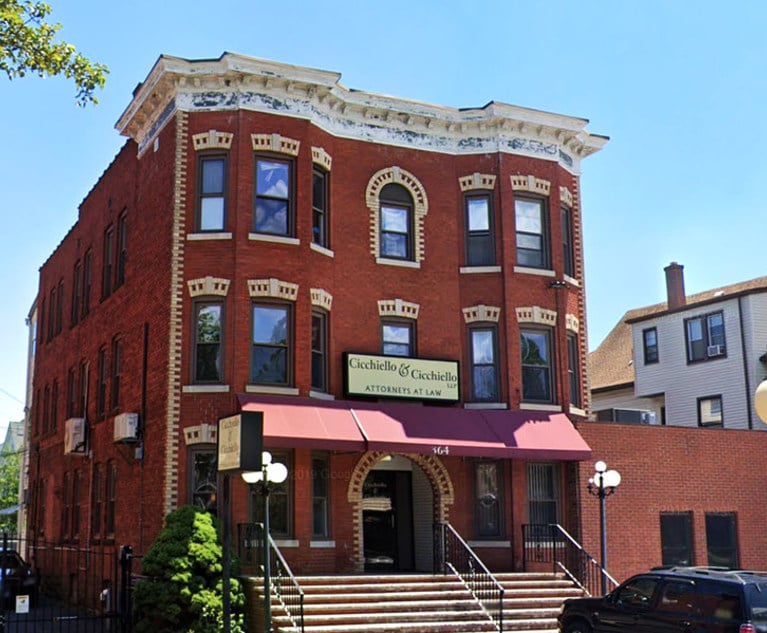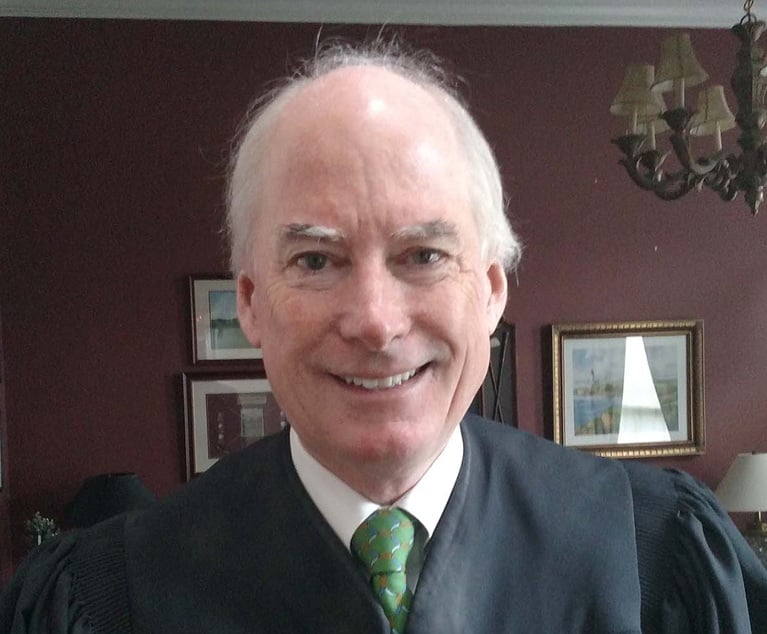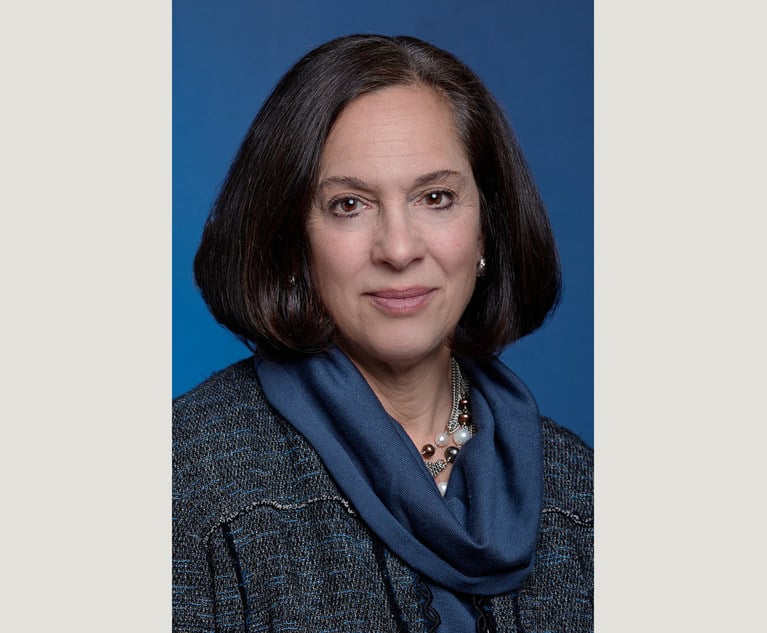 Jerome Dunbar. Courtesy photo.
Jerome Dunbar. Courtesy photo.New Haven Man Arrested for Practicing Law Without a License for 13 Years
New Haven resident Jerome Dunbar has been arrested on seven counts of unauthorized practice of law for allegedly representing or advising people in Connecticut courtrooms. He faces more than five years in prison.
July 08, 2019 at 06:06 PM
3 minute read
A New Haven man has been arrested for allegedly representing clients in court for about 13 years, even though he's never been an attorney.
Inspectors with the Statewide Prosecution Bureau in the Office of the Chief State Attorney arrested 56-year-old Jerome Dunbar on July 3 and charged him with seven counts of unauthorized practice of law. The offense is a Class D felony and Dunbar could face upward of more than five years in prison and $35,000 in fines.
Dunbar, who has several unrelated convictions primarily for issuing bad checks, is being held on $25,000 bond, pending a July 29 appearance in Hartford Superior Court.
According to an arrest affidavit, beginning in 2006 and up to 2019, Dunbar provided counsel and attempted to represent clients in the Connecticut Appellate Court, Connecticut Superior Court, Connecticut Housing Court and Connecticut Department of Labor hearings. The affidavit alleges he filed appearances, wrote and submitted motions, gave legal advice and attempted to appear in front of judges of both the appellate and superior courts on behalf of clients.
It is unclear how Dunbar was allegedly able to work for years representing litigants without a law license.
Representing Dunbar is the Office of the Public Defender in Hartford. Dave Warner, chief public defender for that office, did not respond to a request for comment Monday.
Brian Staines, chief disciplinary counsel for the state's Office of Chief Disciplinary Counsel, did not respond to a request for comment Monday.
The arrest affidavit said Dunbar told authorities he believed he was within his rights to represent clients because he was using the title “Attorney in Fact.” But in presenting himself as an attorney when he was not one, Dunbar violated the Connecticut General Statute, according to the affidavit.
The OCDC wrote a letter to Dunbar in 2007 advising him that describing himself as an ”attorney in fact” didn't give him “the right to act as a legal representative in a court or quasi-legal forum,” according to the affidavit.
During the course of its investigation, the OCDC allegedly found that Dunbar told the Department of Labor that he'd used the wrong terminology in documents when he referred to himself as attorney in fact. At the time, the OCDC believed it was a one-time incident, and closed the case in May 2007. But Dunbar allegedly continued to take on clients for years, and represented at least seven individuals.
In response to other complaints, the OCDC wrote to Dunbar in 2010, advising him he could not represent a client in an administrative matter.
“Only a lawyer can do that,” according to that letter quoted in the arrest affidavit. “We have told you that in the past.”
According to the affidavit, the Statewide Grievance Committee then gave Dunbar 30 days to respond.
“I have no evidence that Dunbar ever responded to the letter,” said Joanne Schaller, an inspector with the Connecticut Division of Criminal Justice, who wrote and signed the affidavit. “The OCDC closed this case on Nov. 2, 2010.”
But, the affidavit says, since 2014, several more complaints emerged against Dunbar, including allegations he attempted to represent a man in a foreclosure case, a woman in an eviction proceeding and another litigant in a custody modification case.
This content has been archived. It is available through our partners, LexisNexis® and Bloomberg Law.
To view this content, please continue to their sites.
Not a Lexis Subscriber?
Subscribe Now
Not a Bloomberg Law Subscriber?
Subscribe Now
NOT FOR REPRINT
© 2024 ALM Global, LLC, All Rights Reserved. Request academic re-use from www.copyright.com. All other uses, submit a request to [email protected]. For more information visit Asset & Logo Licensing.
You Might Like
View All
Managing Partner Vindicated in Disciplinary Proceeding Brought by Former Associate
5 minute read
2nd Circuit Revives Connecticut Lawyers' Challenge to Anti-Discrimination Ethics Rule

Trending Stories
- 1'Largest Retail Data Breach in History'? Hot Topic and Affiliated Brands Sued for Alleged Failure to Prevent Data Breach Linked to Snowflake Software
- 2Former President of New York State Bar, and the New York Bar Foundation, Dies As He Entered 70th Year as Attorney
- 3Legal Advocates in Uproar Upon Release of Footage Showing CO's Beat Black Inmate Before His Death
- 4Longtime Baker & Hostetler Partner, Former White House Counsel David Rivkin Dies at 68
- 5Court System Seeks Public Comment on E-Filing for Annual Report
Who Got The Work
Michael G. Bongiorno, Andrew Scott Dulberg and Elizabeth E. Driscoll from Wilmer Cutler Pickering Hale and Dorr have stepped in to represent Symbotic Inc., an A.I.-enabled technology platform that focuses on increasing supply chain efficiency, and other defendants in a pending shareholder derivative lawsuit. The case, filed Oct. 2 in Massachusetts District Court by the Brown Law Firm on behalf of Stephen Austen, accuses certain officers and directors of misleading investors in regard to Symbotic's potential for margin growth by failing to disclose that the company was not equipped to timely deploy its systems or manage expenses through project delays. The case, assigned to U.S. District Judge Nathaniel M. Gorton, is 1:24-cv-12522, Austen v. Cohen et al.
Who Got The Work
Edmund Polubinski and Marie Killmond of Davis Polk & Wardwell have entered appearances for data platform software development company MongoDB and other defendants in a pending shareholder derivative lawsuit. The action, filed Oct. 7 in New York Southern District Court by the Brown Law Firm, accuses the company's directors and/or officers of falsely expressing confidence in the company’s restructuring of its sales incentive plan and downplaying the severity of decreases in its upfront commitments. The case is 1:24-cv-07594, Roy v. Ittycheria et al.
Who Got The Work
Amy O. Bruchs and Kurt F. Ellison of Michael Best & Friedrich have entered appearances for Epic Systems Corp. in a pending employment discrimination lawsuit. The suit was filed Sept. 7 in Wisconsin Western District Court by Levine Eisberner LLC and Siri & Glimstad on behalf of a project manager who claims that he was wrongfully terminated after applying for a religious exemption to the defendant's COVID-19 vaccine mandate. The case, assigned to U.S. Magistrate Judge Anita Marie Boor, is 3:24-cv-00630, Secker, Nathan v. Epic Systems Corporation.
Who Got The Work
David X. Sullivan, Thomas J. Finn and Gregory A. Hall from McCarter & English have entered appearances for Sunrun Installation Services in a pending civil rights lawsuit. The complaint was filed Sept. 4 in Connecticut District Court by attorney Robert M. Berke on behalf of former employee George Edward Steins, who was arrested and charged with employing an unregistered home improvement salesperson. The complaint alleges that had Sunrun informed the Connecticut Department of Consumer Protection that the plaintiff's employment had ended in 2017 and that he no longer held Sunrun's home improvement contractor license, he would not have been hit with charges, which were dismissed in May 2024. The case, assigned to U.S. District Judge Jeffrey A. Meyer, is 3:24-cv-01423, Steins v. Sunrun, Inc. et al.
Who Got The Work
Greenberg Traurig shareholder Joshua L. Raskin has entered an appearance for boohoo.com UK Ltd. in a pending patent infringement lawsuit. The suit, filed Sept. 3 in Texas Eastern District Court by Rozier Hardt McDonough on behalf of Alto Dynamics, asserts five patents related to an online shopping platform. The case, assigned to U.S. District Judge Rodney Gilstrap, is 2:24-cv-00719, Alto Dynamics, LLC v. boohoo.com UK Limited.
Featured Firms
Law Offices of Gary Martin Hays & Associates, P.C.
(470) 294-1674
Law Offices of Mark E. Salomone
(857) 444-6468
Smith & Hassler
(713) 739-1250











